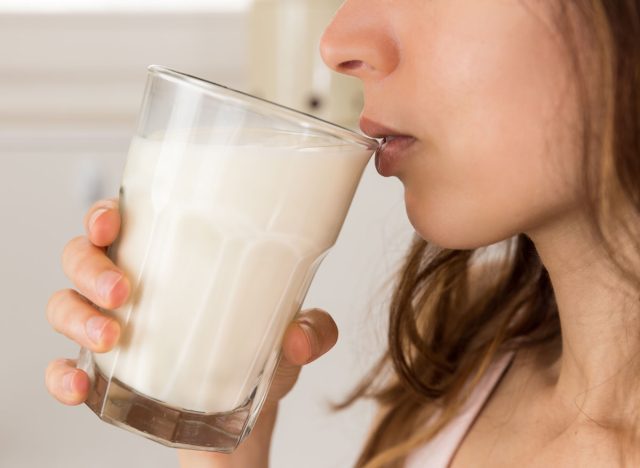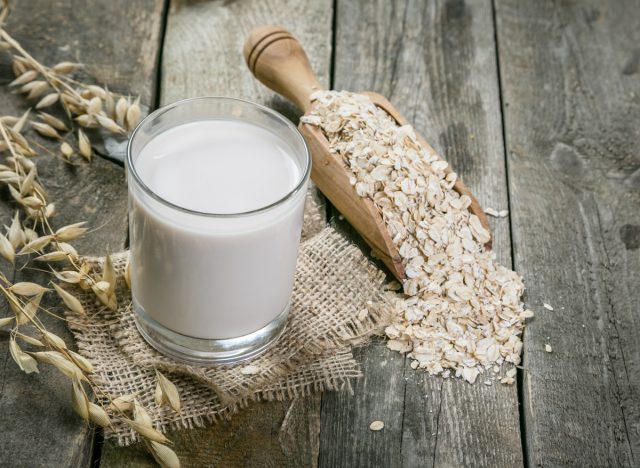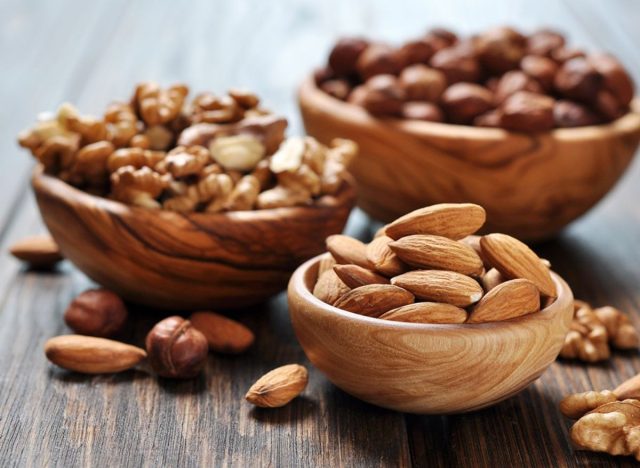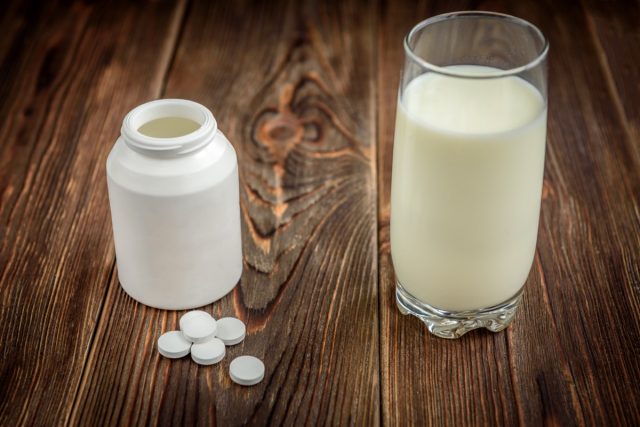Out of all the plant-based milk alternatives, oat milk might be the dairy-free darling. In 2022, this non-dairy milk saw the largest increase in sales compared to its vegan competitors, with a 50% boost that accounted for $527.44 million in sales that year, according to a VegNews report. And the drink's limelight moment makes sense: Its creamy, naturally sweet texture and flavor rivals real milk, and it's suitable for people avoiding dairy. But as health-conscious folks continue pouring the oaty beverage into their iced lattes and bowls of cereal, we can't help but wonder whether oat milk is actually good for you.
We spoke to two registered dietitians and reviewed the research to lay down all the effects of drinking oat milk.
Oat Milk Nutrition Facts
When it comes to this plant-based milk, the nutrition facts can be just as varied as the multitude of brands you see stocked on store shelves. "Because different types of oat milk vary so much from brand to brand, it is very important to evaluate the label," says Courtney Pelitera, MS, RD, CNSC, a dietitian specializing in sports nutrition.
Overall, you'll want to look for oat milk that's fortified with vitamins A and D and calcium and is free of added sugars. For example, we like Chobani's Zero Sugar Original Oatmilk, which contains the following nutrition:
CALORIES: 90
FAT: 5 g (Saturated fat: 0.5 g)
SODIUM: 50 mg
CARBS: 9 g (Fiber: <1 g, Sugar: 0 g)
PROTEIN: 1 g
VITAMIN A: 10% DV
VITAMIN D: 10% DV
CALCIUM: 10% DV
Chobani's Zero Sugar Oatmilk contains the following ingredients: Oat blend (water, whole grain oats), rapeseed oil, sea salt, natural flavors, vitamin A palmitate, vitamin D2 (yeast extract), calcium carbonate, gellan gum, dipotassium phosphate.
Effects of Drinking Oat Milk
You may consume more carbs.

The carbohydrate content in oat milk can differ significantly from brand to brand. Most flavored varieties contain around 15 to 20 grams of carbohydrates per 8-ounce glass, Pelitera says. Meanwhile, unflavored varieties can have around 10 to 20 grams.
To compare, let's look at the carb count in 8-ounce servings of other types of milk:
- 1% dairy milk has about 13 grams of carbs
- Unsweetened soy milk has about 12 grams of carbs
- Unsweetened almond milk contains 3 grams of carbs
If you're on a low-carb diet or live with diabetes, oat milk's higher-carb content may not make it the most suitable alternative milk option for you. But if you're keen on keeping this type of milk stocked in your fridge, aim for unsweetened and unflavored varieties to keep the carbohydrate count low.
You'll get some fiber.

Some—but not all—oat milk brands contain fiber. And that's a good thing since dairy milk and most other plant-based milk alternatives aren't a source of fiber, a nutrient most of us don't get enough of daily.
"The fiber sourced from oat milk is called beta-glucan, and this puts it in a league of its own compared to other plant-based milk," says Lena Bakovic, MS, RDN, CNSC, a dietitian specializing in chronic disease and weight management.
Beta-glucan is a soluble fiber, which means it dissolves in water and helps lower cholesterol levels and blood sugar. It also has the unique ability to increase the viscosity of food, which is why oat milk tends to be thicker and can, therefore, help you feel fuller for longer, according to a 2023 study in the journal Food Chemistry: X.
You won't get much protein with oat milk.

Unlike dairy or soy milk, oat milk doesn't contain much protein. "It's low in protein compared to other plant-based milk options, containing somewhere in the range of 3 to 4 grams of protein in a 1-cup serving," Bakovic says, adding that "Cow's milk, in comparison, is relatively high in protein and can contain up to 12 grams of protein in 1 cup."
Protein is an important macronutrient for many reasons: It helps maintain lean muscle, curb hunger, and support cellular repair. "If an individual's overall dietary patterns are otherwise low in protein, then consuming oat milk on a regular basis may not be of much benefit," Bakovic says.
It may not be okay for people with celiac disease or nut allergies.

While oats are a naturally gluten-free grain, many oat products—including oat milk—may actually contain gluten because of the way they're processed.
If you have celiac disease or gluten sensitivity, always make sure that the oat milk you purchase is Certified Gluten-Free, Pelitera says. The Certified Gluten-Free seal guarantees that the product hasn't been cross-contaminated with gluten-containing ingredients.
"And keep in mind with other allergies that oat milk may be processed in a facility that also processes other types of milk, such as nut milk," Pelitera warns. So, if you have a nut allergy, check the milk's label to ensure it hasn't been processed in a facility that handles nuts.
Oat milk is good for people avoiding dairy.

Oat milk is basically made by blending oats and water and then straining out the pulp. That means it's naturally free of dairy, and it's usually vegan, too. For people avoiding dairy, like those with lactose intolerance or a dairy allergy, oat milk can be a great alternative to cow's milk.
About 70% of people can't tolerate lactose very well. Since oat milk is naturally lactose-free, people sensitive to this type of dairy-derived sugar can avoid uncomfortable symptoms, like diarrhea and gas, by switching to this milk alternative, according to the study in Food Chemistry: X.
It can be a source of calcium and vitamins.

Dairy milk is naturally high in calcium, and most milk in the U.S. is also fortified with vitamins A and D. To help match dairy milk's stellar nutritional profile, many manufacturers fortify their oat milk with vitamin D and calcium.
"When using oat milk as a replacement for dairy milk, it is important to make sure it is fortified [with these nutrients]—otherwise, oat milk does not make for a great substitute because the nutritional content is not comparable," says Pelitera. So before buying a carton, check the nutrition facts label for vitamin A, vitamin D, and calcium levels. Specifically, look at the ingredient list for tricalcium phosphate and calcium carbonate, as these are common forms of calcium used to fortify oat milk, and their bioavailability is similar to that of calcium in milk, per the study in Food Chemistry: X.
Pelitera says this non-dairy milk may also contain other nutrients naturally found in oats, such as B vitamins and phosphorus, which are important for cellular function.
Some oat milk may cause a blood sugar spike.

Oat milk that is high in carbs and low in protein may send your blood sugar on a rollercoaster, and that's especially problematic if you live with diabetes. Flavored varieties like chocolate and vanilla often contain over 15 grams of added sugar. All of that added sugar can leave your blood sugar spiking. Plus, the lack of protein in oat milk isn't making matters any better.
On the other hand, "Milk containing higher amounts of protein will slow down digestion and have much less of an effect on blood glucose levels," Peltier says. For protein, Pelitera recommends soy and dairy milk, which can have around 8 grams of protein per cup.
Sugary options may contribute to weight gain.

Flavored oat milk may add a little fun to your morning latte, but these aren't cartons you want to keep in your fridge on the regular. Sugary oat milk contains extra calories from added sugar. In some cases, regularly drinking sugary, flavored varieties might contribute to weight gain over time.
"In order for weight gain to occur, a person needs to be eating an excess of calories compared to their calorie needs, " says Pelitera. If you add a glass of chocolate oat milk to your day, those extra calories can add up. And on top of that, many brands don't contain fiber or protein to keep you full or blunt that blood sugar response.
If weight loss or maintenance is your goal and you'd like to keep oat milk in your diet, limit options with added sugar and go for the brand with the highest protein and fiber content.
Is Oat Milk Good For You?
If you're seesawing between keeping oat milk in your diet or cutting it out, it all boils down to personal preferences, tastes, and tolerances.
This milk can be a good option for people who favor plant-based alternatives to cow's milk, such as those avoiding dairy due to an allergy, intolerance, or other reasons, Pelitera says.
But it's also worth noting that oat milk isn't the best nutritional option because it lacks protein. If your goal is to build and maintain muscle mass or lose weight, you should prioritize protein in your diet. And if your diet is already low in protein, regularly drinking this milk alternative probably won't help much, Bakovic says.
However, if you love the taste of oat milk and prefer to keep some stocked in your pantry, choose a brand that's free of added sugars and has some protein and fiber to help keep you full.
No comments:
Post a Comment